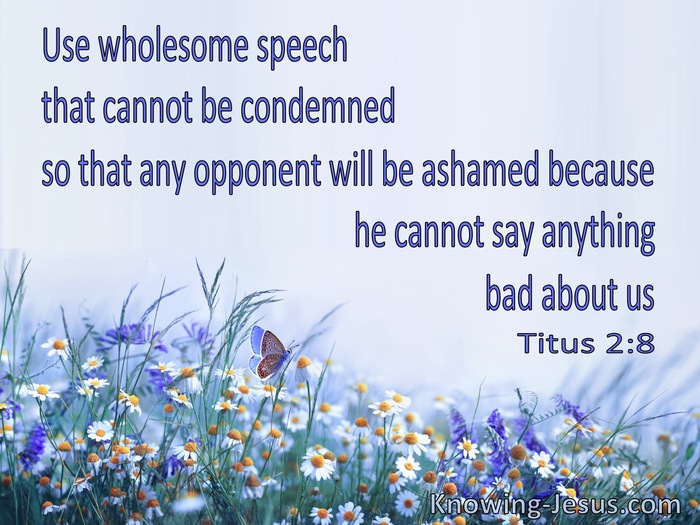Parallel Verses
An Understandable Version
and sound speech that cannot be condemned, so that the person who opposes [us] will have to be ashamed for not having anything bad to say about us.
New American Standard Bible
sound in speech which is beyond reproach, so
King James Version
Sound speech, that cannot be condemned; that he that is of the contrary part may be ashamed, having no evil thing to say of you.
Holman Bible
Your message is to be sound beyond reproach,
International Standard Version
Use wholesome speech that cannot be condemned. Then any opponent will be ashamed because he cannot say anything bad about us.
A Conservative Version
sound speech, irreproachable, so that the man of opposition may be ashamed, having nothing bad to say about us.
American Standard Version
sound speech, that cannot be condemned; that he that is of the contrary part may be ashamed, having no evil thing to say of us.
Amplified
sound and beyond reproach in instruction, so that the opponent [of the faith] will be shamed, having nothing bad to say about us.
Anderson New Testament
sound speech that can not be condemned; that he that is opposed may be ashamed, seeing he has no evil thing to say of us.
Bible in Basic English
Saying true and right words, against which no protest may be made, so that he who is not on our side may be put to shame, unable to say any evil of us.
Common New Testament
and sound speech that cannot be condemned, so that an opponent may be put to shame, having nothing bad to say about us.
Daniel Mace New Testament
gravity; let your doctrine be sound and inoffensive, that your opponents may be ashamed, and have nothing that is ill to say of us.
Darby Translation
a sound word, not to be condemned; that he who is opposed may be ashamed, having no evil thing to say about us:
Godbey New Testament
the sound word, irrefutable, in order that the adversary may be ashamed, having nothing evil to say concerning us.
Goodspeed New Testament
and present a wholesome, unobjectionable message, so that your opponent may be put to shame at finding nothing bad to say about us.
John Wesley New Testament
that he who is on the contrary part may be ashamed, having no evil thing to say of us.
Julia Smith Translation
The word sound, not to be condemned; that he from the opposite may be changed, having nothing bad to say of you.
King James 2000
Sound speech, that cannot be condemned; that he that is an opponent may be ashamed, having no evil thing to say of you.
Lexham Expanded Bible
sound message beyond reproach, in order that {an opponent} may be put to shame, [because he] has nothing bad to say concerning us.
Modern King James verseion
in sound speech that cannot be condemned, that he who is opposed may be ashamed, having no evil thing to say of you.
Modern Spelling Tyndale-Coverdale
and with the wholesome word which cannot be rebuked, that he which withstandeth may be ashamed, having no thing in you that he may dispraise.
Moffatt New Testament
let your words be sound and such that no exception can be taken to them, so that the opposite side may be confounded by finding nothing that they can say to our discredit.
Montgomery New Testament
Let the instruction that you give be sound and above reproach, so that our opponents may be ashamed because they find no evil things to say about us.
NET Bible
and a sound message that cannot be criticized, so that any opponent will be at a loss, because he has nothing evil to say about us.
New Heart English Bible
and a sound message that cannot be condemned; that he who opposes you may be ashamed, having no evil thing to say about us.
Noyes New Testament
sound speech that cannot be condemned; that he that is opposed to us may be put to shame, having no evil thing to say of us.
Sawyer New Testament
sound argument not to be condemned, that the adversary may be ashamed, having nothing evil to say of us.
The Emphasized Bible
healthful discourse that cannot be condemned, in order that, he that is of the contrary part, may relent, having nothing to say concerning us that is disparaging:
Thomas Haweis New Testament
sound discourse, incapable of confutation; that he who is in opposition may be confounded, having nothing faulty to say of you.
Twentieth Century New Testament
let the instruction that you give be sound and above reproach, so that the enemy may be ashamed when he fails to find anything bad to say about us.
Webster
Sound speech that cannot be condemned; that he that is of the contrary part may be ashamed, having no evil thing to say concerning you.
Weymouth New Testament
and healthy language which no one can censure, so that our opponents may feel ashamed at having nothing evil to say against us.
Williams New Testament
let your message be wholesome and unobjectionable, so that our opponent may be put to shame at having nothing evil to say about us.
World English Bible
and soundness of speech that can't be condemned; that he who opposes you may be ashamed, having no evil thing to say about us.
Worrell New Testament
sound speech not to be condemned; that he who is of the contrary part may be ashamed, having no evil thing to say concerning us.
Worsley New Testament
that he who opposeth it may be ashamed, having no evil to say of you.
Youngs Literal Translation
discourse sound, irreprehensible, that he who is of the contrary part may be ashamed, having nothing evil to say concerning you.
Themes
Christian ministers » Personal bearing of
Conversation » Speech, admonitions concerning
Men » Spiritual » Evil men put to silence
men Silenced » Evil men put to silence
Sobriety » Who should be sober
Speech » Admonitions concerning
Speech/communication » How to speak
Speech/communication » What should proceed out of your mouth
Interlinear
References
Word Count of 37 Translations in Titus 2:8
Prayers for Titus 2:8
Verse Info
Context Readings
Sound Instruction And Consistent Behavior
7 In everything [you do], you should show that you are a [proper] example of doing good deeds. In your teaching show integrity, dignity, 8 and sound speech that cannot be condemned, so that the person who opposes [us] will have to be ashamed for not having anything bad to say about us. 9 Slaves should be in subjection to their own masters in everything. They should try hard to please them, without talking back
Phrases
Cross References
1 Peter 2:12
You should live such good lives before [unconverted] Gentiles, so that even though they accuse you of being evildoers, by seeing your good deeds, they will [be led to] honor God [for you] on the day He visits us again [i.e., to bring judgment].
2 Thessalonians 3:14
And if any person does not obey our instructions, [given] in this letter, you should take note of him so that you do not associate with him, in hope that he will become ashamed [of his conduct].
1 Timothy 5:14
Therefore, I want the younger widows to get married, have children and manage their homes, so that they do not give the enemy [i.e., non-Christians] an opportunity for speaking against [the church].
1 Timothy 6:3
If anyone teaches a different doctrine [i.e., from what has been urged above], and does not agree to [proclaim the] sound words of our Lord Jesus Christ and to teaching that is godly [i.e., in harmony with godliness],
1 Peter 3:16
May your conscience be able to so approve of your conduct that, even if you are ridiculed, those doing it will [eventually] have to be ashamed [of themselves] for criticizing your Christian behavior.
Mark 12:17
Then Jesus replied to them, "Pay to Caesar whatever belongs to Caesar and pay to God whatever belongs to God." And they greatly marveled at Him.
Mark 12:28
Then one of the experts in the law of Moses [Note: Matt. 22:34 identifies him as being a Pharisee also], came and heard Jesus and the Sadducees discussing together [i.e., the subject of the resurrection], and knowing that Jesus had refuted the Sadducees successfully, asked Him, "Which commandment is foremost, above all the others?"
Mark 12:32
The expert in the law of Moses said to Jesus, "Truly, Teacher, you are right in saying that God is [the only] one and that there is no other God but Him.
Mark 12:34
When Jesus saw that this man answered wisely, He said to him, "You are not [very] far from the kingdom of God." And after that, no one dared to ask Him any more questions.
Luke 13:17
And as He said these things, all of His enemies felt ashamed [i.e., for objecting to such a noble act], but the whole crowd rejoiced over all the wonderful things He was doing.
Philippians 2:14-16
Do everything without complaining and arguing,
1 Peter 2:15
For it is God's will that, by doing good, you should put to silence the ignorant [talk and actions] of foolish people.







